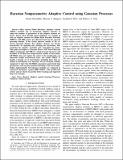| dc.contributor.author | Chowdhary, Girish | |
| dc.contributor.author | Kingravi, Hassan A. | |
| dc.contributor.author | How, Jonathan P. | |
| dc.contributor.author | Vela, Patricio A. | |
| dc.date.accessioned | 2015-05-21T14:44:34Z | |
| dc.date.available | 2015-05-21T14:44:34Z | |
| dc.date.issued | 2015-02 | |
| dc.date.submitted | 2013-02 | |
| dc.identifier.issn | 2162-237X | |
| dc.identifier.issn | 2162-2388 | |
| dc.identifier.uri | http://hdl.handle.net/1721.1/97050 | |
| dc.description.abstract | Most current model reference adaptive control (MRAC) methods rely on parametric adaptive elements, in which the number of parameters of the adaptive element are fixed a priori, often through expert judgment. An example of such an adaptive element is radial basis function networks (RBFNs), with RBF centers preallocated based on the expected operating domain. If the system operates outside of the expected operating domain, this adaptive element can become noneffective in capturing and canceling the uncertainty, thus rendering the adaptive controller only semiglobal in nature. This paper investigates a Gaussian process-based Bayesian MRAC architecture (GP-MRAC), which leverages the power and flexibility of GP Bayesian nonparametric models of uncertainty. The GP-MRAC does not require the centers to be preallocated, can inherently handle measurement noise, and enables MRAC to handle a broader set of uncertainties, including those that are defined as distributions over functions. We use stochastic stability arguments to show that GP-MRAC guarantees good closed-loop performance with no prior domain knowledge of the uncertainty. Online implementable GP inference methods are compared in numerical simulations against RBFN-MRAC with preallocated centers and are shown to provide better tracking and improved long-term learning. | en_US |
| dc.description.sponsorship | United States. Office of Naval Research. Multidisciplinary University Research Initiative (Grant N000141110688) | en_US |
| dc.description.sponsorship | National Science Foundation (U.S.) (Grant ECS 0846750) | en_US |
| dc.language.iso | en_US | |
| dc.publisher | Institute of Electrical and Electronics Engineers (IEEE) | en_US |
| dc.relation.isversionof | http://dx.doi.org/10.1109/TNNLS.2014.2319052 | en_US |
| dc.rights | Creative Commons Attribution-Noncommercial-Share Alike | en_US |
| dc.rights.uri | http://creativecommons.org/licenses/by-nc-sa/4.0/ | en_US |
| dc.source | MIT web domain | en_US |
| dc.title | Bayesian Nonparametric Adaptive Control Using Gaussian Processes | en_US |
| dc.type | Article | en_US |
| dc.identifier.citation | Chowdhary, Girish, Hassan A. Kingravi, Jonathan P. How, and Patricio A. Vela. “Bayesian Nonparametric Adaptive Control Using Gaussian Processes.” IEEE Transactions on Neural Networks and Learning Systems 26, no. 3 (March 2015): 537–550. | en_US |
| dc.contributor.department | Massachusetts Institute of Technology. Department of Aeronautics and Astronautics | en_US |
| dc.contributor.department | Massachusetts Institute of Technology. Laboratory for Information and Decision Systems | en_US |
| dc.contributor.mitauthor | How, Jonathan P. | en_US |
| dc.relation.journal | IEEE Transactions on Neural Networks and Learning Systems | en_US |
| dc.eprint.version | Original manuscript | en_US |
| dc.type.uri | http://purl.org/eprint/type/JournalArticle | en_US |
| eprint.status | http://purl.org/eprint/status/NonPeerReviewed | en_US |
| dspace.orderedauthors | Chowdhary, Girish; Kingravi, Hassan A.; How, Jonathan P.; Vela, Patricio A. | en_US |
| dc.identifier.orcid | https://orcid.org/0000-0001-8576-1930 | |
| mit.license | OPEN_ACCESS_POLICY | en_US |
| mit.metadata.status | Complete | |
